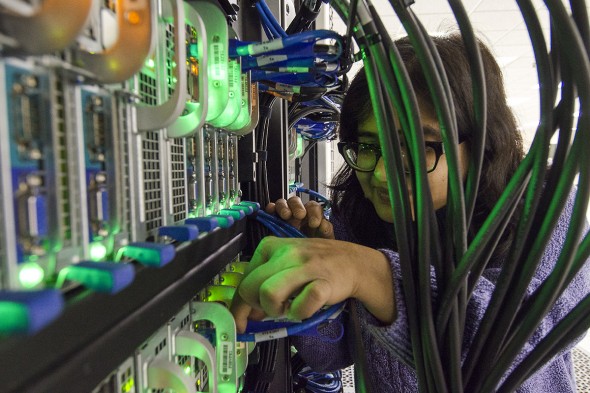Computing cluster handles big bytes of processing

UIC’s High Performance Computing Cluster benefits many researchers on campus who use large data sets or need intensive computing power. Photo: Joshua Clark/UIC Photo Services
In her studies examining membrane proteins at an atomic scale, Fatemeh Khalili-Araghi generates a lot of data.
So much data that she’s been using supercomputers at Argonne National Laboratory for her research.
But the opening of a new High Performance Computing Cluster at UIC this month will let her complete research processes on campus.
“Having a cluster on campus will certainly help,” said Khalili-Araghi, assistant professor of physics, who studies the function of membrane proteins used in transport processes in the human body.
The $2.4 million high performance computing cluster, housed in the Roosevelt Road Building, has 3,000 processors, 22,000 gigabytes of RAM and 1 petabyte (a quadrillion bytes) of disk storage.
“With the arrival of a high performance computing cluster on campus, UIC has significantly expanded research computing capabilities in many areas, including informatics and ‘big data’ as well as student training in cluster and cloud-based computing, making our graduates more attractive — and boosted our competitiveness among other universities,” said Mitra Dutta, vice chancellor for research.
The cluster is a campuswide initiative of the UIC Information Technology and Governance Council Research Committee and its High Performance Computing subcommittee; the Office of the Vice Chancellor for Research; Academic Computing and Communications Center; Office of the Provost; and Administrative Information Technology Services.
“This is a great accomplishment in terms of the level of cooperation and contribution towards a common goal that was achieved through partnership,” said Cynthia Herrera Lindstrom, chief information officer and executive director of ACCC.
The cluster benefits many researchers on campus, said Annette Valenta, chair of the UIC Information Technology and Governance Council Research Committee.
For example, scientists who examine patterns in data that show the gene expression of a disease require more RAM than is available in most computer labs, she said.
“High performance computing environments provide the hardware, software, services and secure environment to provide researchers a mechanism to perform research requiring large data sets and/or intensive computing power,” said Valenta, professor of biomedical and health information sciences and academic director of patient safety leadership in the department of medical education.
The center is an important recruitment tool that has attracted at least six new faculty members, Dutta said.
It is also an advanced learning tool for students, she said.
“We wanted to invest in an infrastructure to educate students so they are employable by places like Google,” she said. “For students, these environments give them the training ground to compete in today’s high-end computing market.”
More information on availability and pricing is available online.
